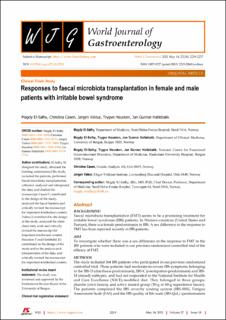| dc.description.abstract | BACKGROUND
Faecal microbiota transplantation (FMT) seems to be a promising treatment for irritable bowel syndrome (IBS) patients. In Western countries (United States and Europe), there is a female predominance in IBS. A sex difference in the response to FMT has been reported recently in IBS patients.
AIM
To investigate whether there was a sex difference in the response to FMT in the IBS patients who were included in our previous randomized controlled trial of the efficacy of FMT.
METHODS
The study included 164 IBS patients who participated in our previous randomized controlled trial. These patients had moderate-to-severe IBS symptoms belonging to the IBS-D (diarrhoea-predominant), IBS-C (constipation-predominant) and IBS-M (mixed) subtypes, and had not responded to the National Institute for Health and Care Excellence (NICE)-modified diet. They belonged in three groups: placebo (own faeces), and active treated group (30-g or 60-g superdonor faeces). The patients completed the IBS severity scoring system (IBS-SSS), Fatigue Assessment Scale (FAS) and the IBS quality of life scale (IBS-QoL) questionnaires at the baseline and 2 wk, 1 mo and 3 mo after FMT. They also provided faecal samples at the baseline and 1 mo after FMT. The faecal bacteria profile and dysbiosis were determined using the 16S rRNA gene polymerase chain reaction DNA amplification covering V3-V9; probe labelling by single nucleotide extension and signal detection. The levels of short-chain fatty acids (SCFAs) were determined by gas chromatography and flame ionization.
RESULTS
There was no sex difference in the response to FMT either in the placebo group or active treated group. There was no difference between females and males in either the placebo group or actively treated groups in the total score on the IBS-SSS, FAS or IBS-QoL, in dysbiosis, or in the faecal bacteria or SCFA level. However, the response rate was significantly higher in females with diarrhoea-predominant (IBS-D) than that of males at 1 mo, and 3 mo after FMT. Moreover, IBS-SSS total score was significantly lower in female patients with IBS-D than that of male patients both 1 mo and 3 mo after FMT.
CONCLUSION
There was no sex difference in the response to FMT among IBS patients with moderate-to-severe symptoms who had previously not responded to NICE-modified diet. However, female patients with IBS-D respond better and have higher reduction of symptoms than males after FMT.
El-Salhy M, Casen C, Valeur J, Hausken T, Hatlebakk JG. Responses to faecal microbiota transplantation in female and male patients with irritable bowel syndrome. World J Gastroenterol 2021; 27(18): 2219-2237 [PMID: 34025075 DOI: 10.3748/wjg.v27.i18.2219] | en_US |

